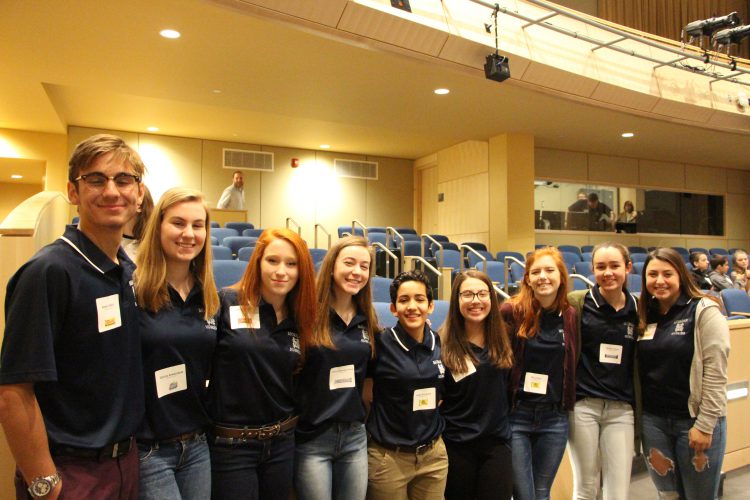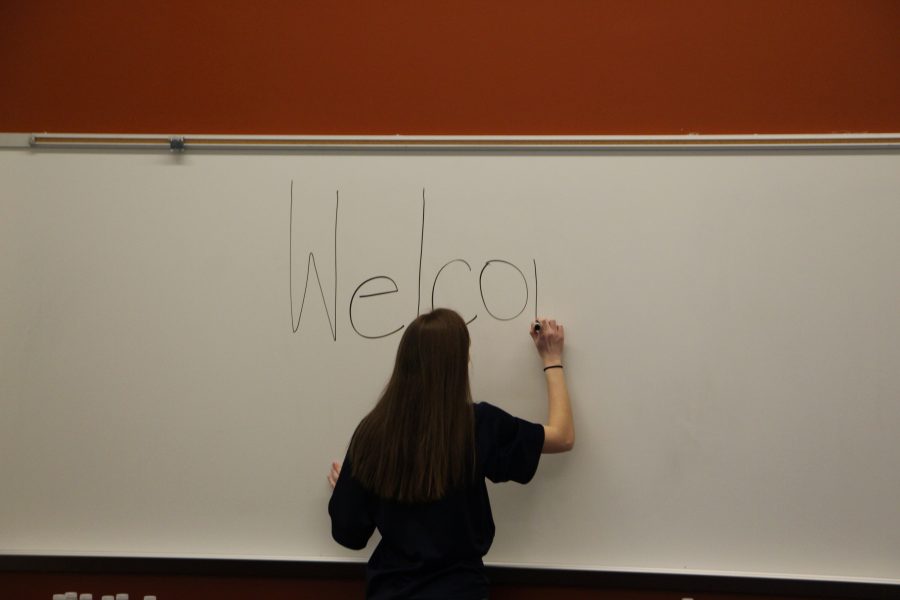Written by Abbey Norton |
On Friday, March 31st, the Husky Leaders and various community members participated in a conference along with students and staff from Coginchaug, Creed, East Hampton, Haddam-Killingworth, Hale-Ray, North Branford, Old Saybrook, Valley Regional, and Westbrook. This conference was held in our own building, and we had the opportunity to host it. The conference focused on bridging the gap between student and administrative voice.
Special Education Teacher Beth Nadeau greeted each school’s chosen administration and students at the lower hub doors at 8:00 am, and each was given name tags. Each name tag had a name of a type of candy on it, which would aid in splitting up the guests. A team of faculty and students from Morgan would lead the smaller group conversations after the initial speech in the auditorium.
At 8:30 am in the auditorium, the guest speaker Mike Regan taught participants about mindsets. Mindsets are broken up into two types: fixed mindset and growth mindset. People who have a fixed mindset, do not feel the need to work toward their talents. They feel as if everyone is born with specific talents and that cannot be changed. Those who have a growth mindset, believe that they can strengthen their talents and work toward set goals. 
Mike Regan explained how mindsets are usually instilled within us as children. Children who are told, “Wow, you did great. You must be really smart/talented” develop fixed mindsets. Children who are told, “Wow, you did great. You must have worked really hard” develop growth mindsets. Both children can achieve wonderful things, but children with growth mindsets are more likely to work for it than children with fixed mindsets.
At 9:10 am, after Mike Regan finished his speech, the Husky Leaders took their groups to designated areas and began a discussion about how growth and fixed mindsets can affect our daily lives. Some groups divided into student and faculty sections, while others talked together. These conversations were engaging for all participants and brought up important topics such as the love of learning and whether or not students should be able to retake tests.
After the discussion was over, all of the groups went to the cafeteria for lunch from 10:15 to 10:45 am. Lunch was provided by the school.
Lunch led us back into discussion. This time schools broke into their separate groups. The Morgan School met in the D wing collaboration room and began to talk about what they learned from meeting with other schools. The main topic of discussion was class rank. Some students thought class rank was important, but others thought it got in the way of learning. It pushes students to be better than everyone else, and if they are not in the top ten, they are not as good as the people that are. A few students also mentioned the problem of cheating because of class rank. Many students feel the need to cheat to keep their rank higher than the majority of the students.

The main topic of discussion was class rank. Some students thought class rank was important, but others thought it got in the way of learning. It pushes students to be better than everyone else, and if they are not in the top ten, they are not as good as the people that are. A few students also mentioned the problem of cheating because of class rank. Many students feel the need to cheat to keep their rank higher than the majority of the students.
Students in The Morgan School learn their class rank as early as the end of their freshmen year. For the next three years, classmates are pitted against each other to stay on top. This can be incredibly difficult because high school is a period of change. Change can make us more prone to stress and anxiety, which can negatively affect grades and rank. Class rank is also always close so a student who is number 20 and has a GPA of 3.66 could be only a few hundredths of a point behind another student who is number 15.
Class rank can also be a good thing. It helps motivate students to be a better student. It is also an incredibly useful tool for college. Class rank helps colleges sort their applicants better, so higher class ranks will help students get into better schools. Sorting students without useful tools such as class rank, GPA, and SAT/ACT scores would take months.
Other topics discussed: encouragement by teachers, re-taking tests, partial credit, the locus of control, and teachers vs. coaches. Overall, the discussion lasted about an hour, and it was full of insightful viewpoints from all different types of students.
From 11:00 am to 12:05 pm, the schools again joined together in the auditorium. Each school shared what types of changes they hope to make in order to reach more positive views of learning. Then, Connecticut Teacher of the Year Lauren Danner gave a speech about encouragement from one of her students and how she became a teacher instead of a scientist.
Attending the conference was an amazing experience. All members involved learned that together as a school, we can make education more enjoyable for everyone involved. To learn more about the conference, talk to one of our Husky Leaders or faculty members. To learn more about mindsets, click here.




